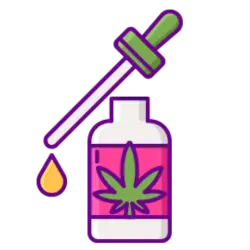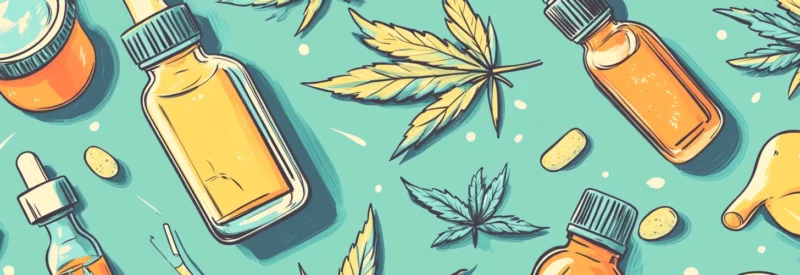TABLE OF CONTENTS
CBD—short for cannabidiol—is an active ingredient in the cannabis sativa plant. Unlike THC, CBD does not produce the “high” associated with cannabis use. In recent years, it has been gaining popularity as an alternative and natural choice for a variety of ailments within many health and wellness communities. As a result, the CBD market is substantially growing and should continue to expand in the coming years, presenting a unique opportunity for entrepreneurs to enter the health and wellness industry.
If you’re looking to start a CBD business and want to know more about CBD, continue reading as we look at what this ingredient is, its benefits, and any risks associated with it. Let’s dive in!
What Is CBD?

CBD is a naturally occurring compound found in hemp plants. As legislation towards CBD grows in leniency, so too does its popularity in communities across the nation. You may have noticed that it has been showing up more and more in health and wellness stores in the form of oils, topical creams, and even gummies.
The primary appeal is that it doesn’t contain the compound tetrahydrocannabinol (THC)—or, at least, it contains only trace amounts, under 0.3% THC in the US—which is the component responsible for making people feel psychoactive effects after consuming cannabis products. Additionally, recent research suggests that CBD may have therapeutic benefits, such as pain relief and anti-anxiety effects. Studies like these have provided a boost to its credibility amongst everyday people looking for natural health solutions.
Is CBD legal in all states?
The 2018 Farm Bill was a huge step forward for those looking for access to both medical and recreational hemp-based products. By legalizing the manufacture, transport, and sale of CBD derived from low-THC hemp, it no longer matters which US state you currently reside in—access to these popular health products is now available everywhere.
Although the Farm Bill has relaxed regulations around CBD, it’s best to refer to CBD state laws as they differ between each state.
What is the difference between CBD, THC, and cannabis oil?
CBD, THC, and cannabis oil are all from the same plant, but they are completely different compounds. CBD is a naturally occurring compound found in cannabis sativa plants that do not produce any kind of psychoactive effects. In the US, to be classified as CBD, the product can have no more than 0.3% THC. On the other hand, THC is the psychoactive component that stimulates psychoactive effects despite being from the same plant as CBD.
Finally, cannabis oil is an oil containing a cannabis extract infuse. As such, it is high in THC. It also comes from recreational cannabis plants instead of the industrial hemp plants that CBD typically comes from.
Note: Please refer to our guide for the difference between CBD, kratom, and kava.
Does cannabidiol have THC?
Cannabidiol, or CBD, is a popular supplement for various health conditions. It differs from other cannabis-based products because it does not contain significant amounts of THC, the psychoactive compound responsible for the high associated with marijuana use. Its main function is to help relax the body without the intoxicating effects associated with marijuana. That’s because CBD doesn’t contain any of the key ingredients necessary to stimulate psychoactive effects, such as active tetrahydrocannabinol (THC) or delta-9-tetrahydrocannabinol (Δ9).
Ultimately, without containing the cannabinoid THC, CBD can offer potential health benefits without the fear of temporarily altering one’s state of mind.
Different Types of CBD Products
As the commercial potential for CBD grows, so too do the commercial product lines. Today, there are now an enormous variety of ways people can choose to use it. From gummies and tinctures to lotions, balms, or capsules—these options offer different avenues within the consumer market to tap into the power of CBD.
For those wanting quick effects with maximum precision, tinctures are probably best. By using a dropper, you can measure exactly how much you take every time. Alternatively, if you want something tasty and sweet, there is always a supply of CBD-infused gummies. These can be great for micro-dosing (i.e., taking smaller amounts). And finally, there’s smoking. This traditional method works pretty fast but may not be suitable for everyone due to the potential lung-related risks you see with smoking anything else.
What is CBD used for?
Today, people are beginning to discover all kinds of uses for CBD. Some people take it daily for its anti-inflammatory agents and stress-relieving effects. There are even pet owners who use CBD to help ease fears or excessive barking in their four-legged friends.
Ways CBD Benefits Your Health
CBD use has many benefits and ways to improve your health. For starters, CBD may reduce anxiety, symptoms of insomnia, and pain. In addition, studies suggest that it may have anti-inflammatory properties. Anti-inflammatory properties include the potential to help reduce chronic inflammation and improve cardiovascular health. It appears CBD can help people in multiple ways, not only to soothe physical ailments but also to restore balance in their lives through reduced stress levels and improved restful sleep.
Truly, CBD usage is beyond what researchers originally anticipated, proving that life-improving possibilities can come in small packages.
CBD Side Effects and Safety Concerns

CBD is relatively new to the market and is still a controversial topic for some. By understanding the potential undesirable experiences of taking CBD, users can ensure they’re taking the right doses needed for their desired results. Below are five important questions to consider regarding the side effects and safety concerns associated with CBD.
Note: As research is ongoing, speak with your healthcare provider before consuming any substances.
1. How does CBD affect the brain and body?
There is still much research being done on the effects that CBD has on the brain. But one thing researchers know for sure is that CBD does not affect the brain the same as THC. It has no psychotropic properties.
2. Does CBD interact with other drugs?
CBD does have the potential to interact with other drugs and medications. That’s why it is extremely important to talk to your doctor or healthcare provider before starting any sort of CBD regimen.
3. Will CBD affect drug testing results?
CBD alone will almost never cause someone to fail a drug test, but if you’re subject to drug testing, you should proceed with caution. CBD can have a small trace of THC in it, legally up to 0.3%. This could cause a drug test to be positive for marijuana even though the person did not believe they were ingesting any.
4. Is CBD safe to take while pregnant?
The FDA has put out the following statement: “The FDA strongly advises against the use of cannabidiol (CBD), tetrahydrocannabinol (THC), and marijuana in any form during pregnancy or while breastfeeding.”[1]FDA. “What You Should Know About Using Cannabis, Including CBD, When Pregnant or Breastfeeding | FDA”. Accessed on February 15, 2023.
5. How long does CBD stay in your system?
According to Healthline, there are many different factors impacting how long CBD will stay in your system.[2]Healthline. “How Long Does CBD Stay in Your System?”. Accessed on February 15, 2023. These factors include how much CBD you use, how frequently you use CBD, the amount of food you consume, the method in which you take CBD and your body. So, there is no real answer to how long it stays in your system as it can range anywhere from 10 hours to a month.
Final Thoughts on CBD Oil and Its Uses
CBD is revolutionizing the health and wellness industry, and for good reason. Not only is it helping those with chronic pain, anxiety, or other ailments, but it’s also becoming a popular go-to for anyone looking to improve their overall well-being. But to meet this growing consumer demand, aspiring and established merchants alike must secure a high-risk merchant account for CBD payment processing. At PaymentCloud, we leverage our experience in high-risk processing and industry-specific expertise so you can accept payments for your CBD-based products with ease and confidence.
Tired of hearing “no”?
PaymentCloud can help your CBD business accept payments today!
Approval
Rating
CBD Oil: FAQs
How is CBD oil consumed?
Consuming CBD oil is simple and discreet. You can consume it orally in tincture, capsule, edible, or concentrate form. You can place tinctures and concentrates under the tongue for up to 90 seconds before ingestion. CBD oils in edible forms like gummies are a great alternative for those who have difficulty swallowing capsules. Some people even use topicals, applying the product directly to their skin.
No matter which way you choose to take it, CBD oil can work within minutes.
Does CBD make you tired?
Many people have found that using CBD can increase relaxation and reduce stress, leading to improved sleep. For people wanting a good night’s rest, adding some CBD to their routine could be a great way to get there. While some find it makes them drowsy initially, others experience heightened alertness due to reduced anxiety.
Whether or not CBD will make you sleepy will depend on the person, but it could be worth trying out if you’re having trouble getting some quality shut-eye.
Does CBD oil make you high?
No, CBD oil does not make you high, as cannabidiol (CBD) does not have such THC. While THC (tetrahydrocannabinol) is the compound that creates mind-altering effects, CBD has been found to counterbalance these effects. So, consuming CBD oil will not increase or cause feelings of craving, paranoia, uncertainty, or confusion. Instead, it may provide calming sensations that can help people relax.
Can CBD oil be used for PTSD?
Cannabidiol (CBD) oil has become increasingly popular for its potential to help with pain and anxiety relief, but recently, there have been early studies showing it may also be beneficial in treating Post-Traumatic Stress Disorder (PTSD).[3]Medical News Today. “CBD for PTSD: How it works and what to know”. Accessed on February 15, 2023. A few clinical trials suggest that CBD oil could reduce symptoms of PTSD, such as insomnia, flashbacks, nightmares, anxiety, and depression. However, more research needs to be done to understand better the efficacy of using CBD oil as a treatment for PTSD.
Is CBD useful for managing pain?
Cannabidiol (CBD) has quickly become a popular remedy for managing pain. CBD is known to interact with the endocannabinoid system, which is involved in a variety of physiological processes, including pain management. By interacting with the body’s natural cannabinoid receptors, CBD can help reduce pain perception and inflammation. Additionally, studies have found that people using CBD for chronic pain had improved sleep quality and less anxiety and depression. This suggests that CBD’s effects go beyond just easing physical suffering and can provide a comprehensive approach to combating the distress associated with chronic conditions.
Are there any negative side effects of CBD gummies?
While CBD gummies are usually used to help people with physical ailments, they may come with some unintended side effects. Some of the most common side effects include dry mouth, drowsiness, fatigue, and changes in weight or appetite. While these reactions are usually minor and do not last very long, it is important for users to be aware of them. Additionally, some individuals have reported increased paranoia or anxiety when taking CBD products, so it’s best to monitor how you feel when taking them carefully.






